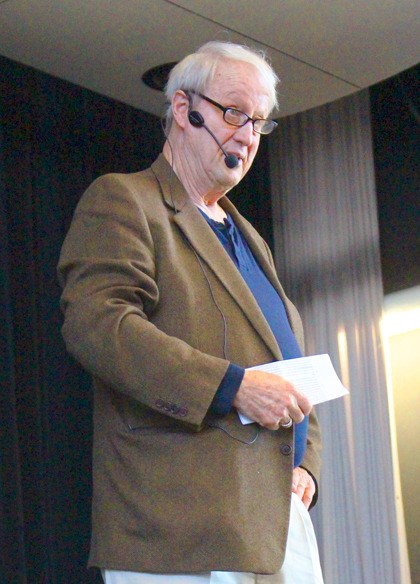It’s hard at times to get high school students to think about larger issues like tax rates, income and the role of corporate contributions in politics — but that didn’t stop Hedrick Smith.
The Pulitzer Prize-winning journalist visited Oak Harbor High School Friday to talk with high school and college students about politics and economics in America. The picture he painted of their future wasn’t a pretty one.
Smith was the first speaker for the Trudy Sundberg Lecture Series, which brings an eminent speaker here to explore education, literature, history, the arts, civic engagement or politics. It’s named for Sundberg, a beloved teacher who died in 2013. Her friends, family and the Sno-Isle Libraries Foundation established a fund in 2013 to underwrite a lecture series that explores her areas of interest. Smith also spoke at other venues on Whidbey.
Smith covered Washington and the world capitals for the New York Times and created award-winning primetime specials for PBS. He’s also an author and his latest book, “Who Stole the American Dream?” is an analysis of the growing gap in income and wealth in the U.S.
The prosperity and growth enjoyed by the middle class after World War II began to deteriorate in the 1980s because of changes in Washington’s policies and the business practices of American corporations. Now the richest one percent controls two-thirds of the economic gains and the rest of us one-third.
“Is that the economy that works well for you?” he asked the students. “You think this is far away. This is happening on Whidbey Island. …Start paying attention because it will have a direct impact on your lives.”
Smith engaged the crowd of students in dialogue. He handed out a true/false list of statements and quizzed them on whether they thought, for instance, America is still the land of opportunity because it’s easier for the children of poor to rise up the economic ladder. Only a hand or two shot up in a room packed with hundreds of young people. “Not anymore!” one young man yelled.
At times, he felt probably the pain of all high school teachers everywhere when no one in the crowd of kids wanted to voice an opinion. He called them “pussycats” instead of Wildcats, which garnered hoots and hollers. As the hour wound down, the students did display a fairly good working knowledge of “dark money” — the money in politics voters can’t follow — and gerrymandering — manipulating legislative and congressional districts to guarantee one party’s candidate wins. Smith said some of the stellar political reporters he knows can guess the results of an election months before it happens. Both parties are guilty of doing it, he said.
His words did make an impression on at least some of the students.
“He was mentioning it was easier for people to make money when they have money,” said Hailee Fleming, 15. “I don’t think that’s right.”
Anyone should have the ability to climb up and out of poverty, she said.
“I’ve been nervous about this country’s future since I was little,” she said. “People may not notice these things until it’s too late.”


